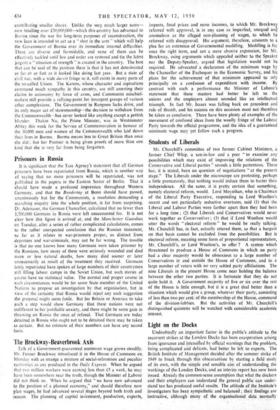The Brockway-Beaverbrook Axis
Talk of a Government-guaranteed minimum wage grows steadily. Mr. Fenner Brockway introduced it in the House of Commons on. Monday with as strange a mixture of social-reformism and peculiar economics as any produced in the Daily Express. When he argued that two million workers were earning less than £5 a week, he may have been somewhere near the truth, though the Minister of Labour did not think so. When he argued that " we have now advanced to the position of a planned economy," and should therefore now plan wages, he had advanced several bstages beyond both truth and reason. The planning of capital investment, production, exports, imports, food prices and some incomes, to which Mr, Brockway referred with approval, is in any case as imperfect, unequal and anomalous as the alleged non-planning of wages, to which he referred with disapproval. His argument, therefore, amounts to a plea for an extension of Governmental meddling. Meddling is for once the right term, and not a mere abusive expression, for Mr, Brockway, using arguments which appealed neither to the Speaker nor the Deputy-Speaker, argued -that legislation would not be required. He advocated a declaration of the minimum wage by the Chancellor of the Exchequer in the Economic Survey, and his plans for the achievement of that minimum appeared to rely principally on a confusion of expenditure with income. By contrast with such a performance the Minister of Labour's statement that these matters had better be left to the unions and the employers almost sounded like an intellectual triumph. In fact Mr. Isaacs was falling back on precedent and rule of thumb, and his success on this occasion must not therefore be taken as conclusive. There have been plenty of examples of the movement of confused ideas from the woolly fringe of the Labour Party towards the official programme, and the idea of a guaranteed minimum wage may yet follow such a progress.






































 Previous page
Previous page